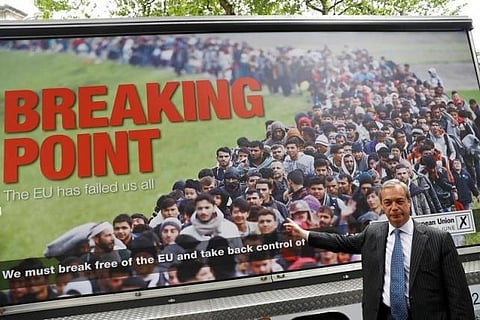Bloodless revolution in Britain
Repercussions across Europe as Cameron says will resign by October

London: A seismic moment; a historic day; a bloodless revolution that has made over the map of Europe — and may very well have set Britain on a course to break up the United Kingdom itself.
A majority of Britons voted 52 to 48 per cent in favour of Leaving the European Union — Brexit.
A little over six hours after polls closed across Britain, a majority of voters had put Britain on the path to separation from Brussels — an unprecedented divorce that sparked a sell off in global markets and led to a crash of 11 per cent for the pound against the dollar.
Prime Minister David Cameron — who gambled on the referendum to quell anti-Europe scepticism in his Conservative party — announced his intention to resign by October. He is a caretaker leader now with no mandate or appetite to begin the two-year negotiation process with Brussels.
Bank of England Governor Mark Carney made an address to calm markets, saying his institution was prepared to put £250 billion into the market to shore up the pound.
German Chancellor Angela Merkel has called the vote a disappointing result and a watershed moment in Europe’s history.
Scotland’s First Minister, Nicola Sturgeon, says she will be putting a second independence referendum process into effect during that two-year negotiation period. A majority of Scottish and Northern Ireland voters opted to stay in, and Sinn Fein, the Irish nationalist party says a vote on a united Ireland needs to happen.
The vote was indeed divisive — London mostly opted for Remain, so too Manchester, Leeds and Liverpool. If big cities voted to stay in, the rural areas opted overwhelmingly to ‘Leave’. But if there was a geographical aspect to the Leave win, it was the sheer weight of the vote in northern England that surprised many. Sheffield, Sunderland, the Midlands — all areas that are traditionally Labour — all areas that voted to Leave in droves.
Elderly voters also opted for "Leave", with more than two out of every three casting their ballot to end the 43-year-old relationship with the European administration in Brussels. They were motivated by a rising fear of new immigrants and declining economic opportunities.
Irish Prime Minister Enda Kenny said the vote required very careful consideration. The vote to leave means that the open border between Northern Ireland and the Republic of Ireland would see a return of customs and passports checks — and could derail to peace process there set in place in 1998 that formally ended three decades of political and sectarian violence.
Thursday’s vote also witnessed a significant gap when it came to age — younger voters mostly opted to Remain. The final YouGov poll before the referendum showed 72 per cent of 18 to 24-year-olds backed a Remain vote — with just 19 per cent backing Brexit.
But it is these younger voters who are the biggest long-term losers from the historic vote to leave the EU.
Liberal Democrat leader Tim Farron said yesterday: “Young people voted to remain by a considerable margin, but were outvoted. They were voting for their future, yet it has been taken from them.”
In cricketing terms, the umpire has ruled out, and no one is quite sure where the boundaries are, or indeed what the rules of this new game will be.
What is clear is that Boris Johnson, the former Mayor of London and a minister at Cameron’s cabinet table, will stand for the leadership of the Conservative party.
On the campaign trial, he was bombastic. By midmorning yesterday, he sounded sombre and almost presidential — praising the leadership of Cameron. He did not give any indication that he will be standing for Cameron’s job yesterday.
Labour Leader Jeremy Corbyn faces a vote of confidence over his handling of the referendum campaign. Although he was elected a year ago, there is growing dissent in his parliamentary party ranks that his performance was lukewarm, and 50 MPs have signed a no confidence letter, which will force a review of his leadership on Monday at the earliest.
Nigel Farage, the leader of the UK’s Independence Party (Ukip), said that June 23 should be marked as independence day. When polls closed, Farage said he feared Remain had done enough to win. He reversed that statement, then wavered, before finally making a speech that described the result as “a great day for decent people”.
He said there should be a general election sooner, rather than later, and said that the UK should fast track its departure from Europe.
But no one is quite sure how that process works. Article 50 of the Treaty of Lisbon must be triggered — and Cameron said that will be up to the new Prime Minister to do so.
That article allows for a two-year negotiation process to begin. But that new PM will face the prospect of winning the best possible terms from a united front of 27 members in no mood for compromise after Cameron’s political gamble failed miserably.
Sign up for the Daily Briefing
Get the latest news and updates straight to your inbox



